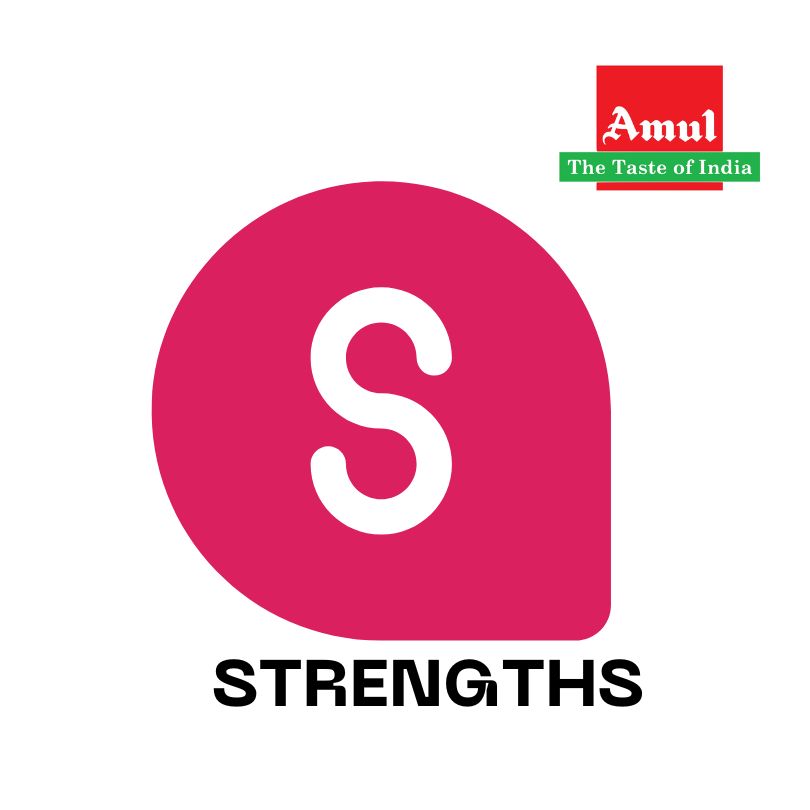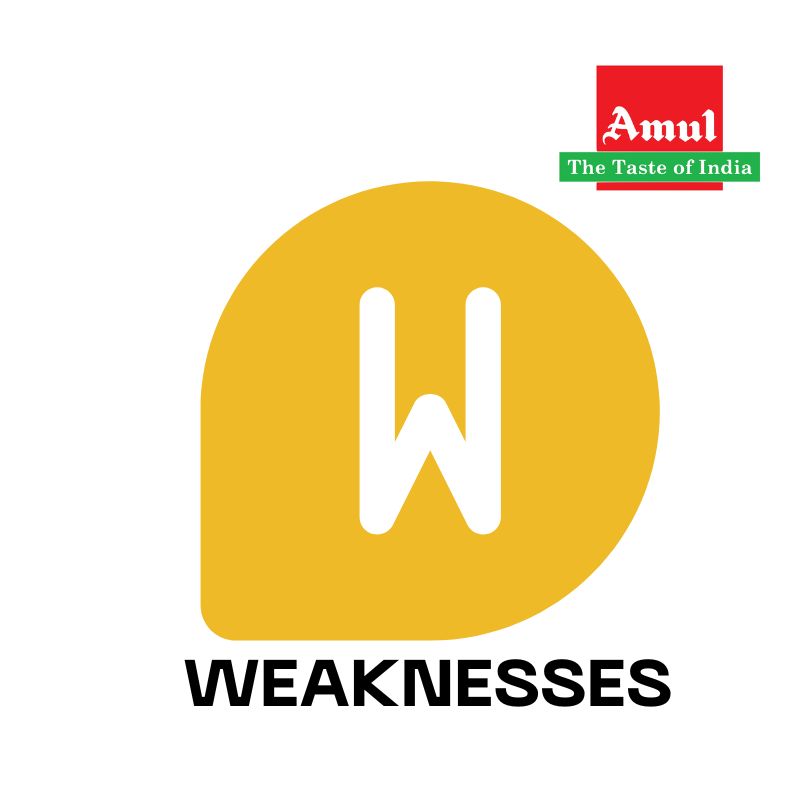SWOT Analysis of Amul: A Comprehensive Study
SWOT Analysis of Amul:
A Comprehensive Study

Amul, a brand managed by the Gujarat Cooperative Milk Marketing Federation (GCMMF), is not just a name but an emotion for millions of Indians. Over the decades, it has become synonymous with dairy products, representing trust, quality, and innovation. This detailed SWOT analysis examines Amul’s Strengths, Weaknesses, Opportunities, and Threats, providing insights into its success story and future potential.

Strong Brand Recognition
Amul is one of the most recognized and trusted brands in India. Its iconic mascot, the Amul girl, and consistent advertising campaigns have made it a household name. The tagline “Utterly Butterly Delicious” resonates with generations of Indians.Extensive Distribution Network
Amul has an unparalleled supply chain that ensures its products reach even the remotest corners of India. With over 10,000 distributors and 1 million retailers, Amul’s network ensures accessibility and availability.
3. Farmer Empowerment Operating on a cooperative model, Amul empowers over 3.6 million dairy farmers. This farmer-centric approach not only ensures a steady supply of milk but also supports rural livelihoods.
4. Diverse Product Portfolio Amul offers a wide range of products, including milk, butter, cheese, ice creams, chocolates, and health drinks. This diversification helps the brand cater to a wide audience and ensures market stability.
5. Affordable Pricing By maintaining competitive pricing without compromising quality, Amul has made its products accessible to all socioeconomic classes.
7. Innovative Marketing Amul’s witty and topical advertisements have consistently captured public attention, making its campaigns highly memorable and relatable.
8. Focus on Quality Amul ensures high standards of hygiene and quality in its production processes. Its robust R&D department constantly works on improving products and introducing innovations.

- Overdependence on Milk Supply Amul’s business heavily relies on milk procurement from farmers. Seasonal fluctuations in milk production can impact the supply chain and product availability.
- Limited Global Presence While Amul has a strong foothold in India, its international presence is relatively limited. Competing with global dairy giants in international markets remains a challenge.
3. Logistics and Storage Issues Dairy products are perishable, requiring efficient cold chain logistics. Any disruption in storage or transportation can lead to significant losses.
4. High Operational Costs Managing a vast supply chain and maintaining quality across such a large network incurs significant operational costs, affecting profitability.
5. Brand Dependency Amul’s identity is heavily tied to its core dairy products. This dependency can limit its flexibility to diversify into non-dairy segments.

Global Expansion With increasing demand for Indian dairy products worldwide, Amul can capitalize on expanding its footprint in international markets, especially in the Middle East, Africa, and Asia-Pacific regions.
Health and Wellness Trends The growing awareness of health and wellness provides an opportunity for Amul to launch more health-oriented products like low-fat milk, plant-based alternatives, and protein-rich snacks.
3. Rural Market Penetration While Amul already has a significant presence in rural India, there is still potential to expand further by introducing affordable, smaller-packaged products tailored for rural consumers.
4. Digital Transformation Leveraging technology for direct-to-consumer (D2C) platforms can help Amul strengthen its relationship with end consumers and increase its reach.
5. Sustainability Initiatives With an increasing emphasis on sustainability, Amul can focus on eco-friendly packaging and sustainable dairy farming practices, appealing to environmentally conscious consumers.
6. Partnerships and Collaborations Collaborating with food chains, restaurants, and international brands can open new revenue streams and increase brand visibility.
7. Innovation in Product Offerings Introducing new flavors, seasonal variants, or niche products like lactose-free milk and vegan cheese can help Amul tap into emerging consumer preferences.

- Rising Competition Amul faces stiff competition from both domestic players like Mother Dairy, Nestle, and Britannia and international brands entering the Indian market. This competition can impact market share and profitability.
- Fluctuating Raw Material Costs The prices of raw materials, especially milk, are subject to seasonal variations and inflation, which can affect production costs and pricing strategies.
3. Regulatory Challenges The dairy industry is subject to various government regulations related to quality, pricing, and food safety. Changes in policies or stricter regulations can pose challenges.
4. Health Concerns Increasing awareness about lactose intolerance and the rise of veganism can lead to a decline in demand for traditional dairy products.
5. Economic Slowdowns Economic instability or slowdowns can reduce consumer spending, impacting the sales of premium and non-essential dairy products.
6. Climate Change Impact Changes in weather patterns can directly impact milk production, affecting the supply chain and overall business operations.
7. Technological Disruptions Competitors leveraging advanced technologies for production, supply chain management, or marketing can create challenges for Amul to stay ahead.
Conclusion
Amul’s journey from a small cooperative in Gujarat to becoming one of the largest dairy brands in the world is a testament to its resilience, innovation, and commitment to quality. While the brand has significant strengths like strong brand equity, a robust distribution network, and a diverse product portfolio, it also faces challenges such as rising competition and logistical issues. However, with opportunities in global expansion, health-focused product lines, and digital transformation, Amul is well-positioned to continue its legacy of excellence.
To maintain its competitive edge, Amul must focus on sustainability, innovation, and leveraging technology to meet evolving consumer needs. By staying true to its roots while embracing change, Amul can further solidify its position as a dairy leader, both in India and globally.